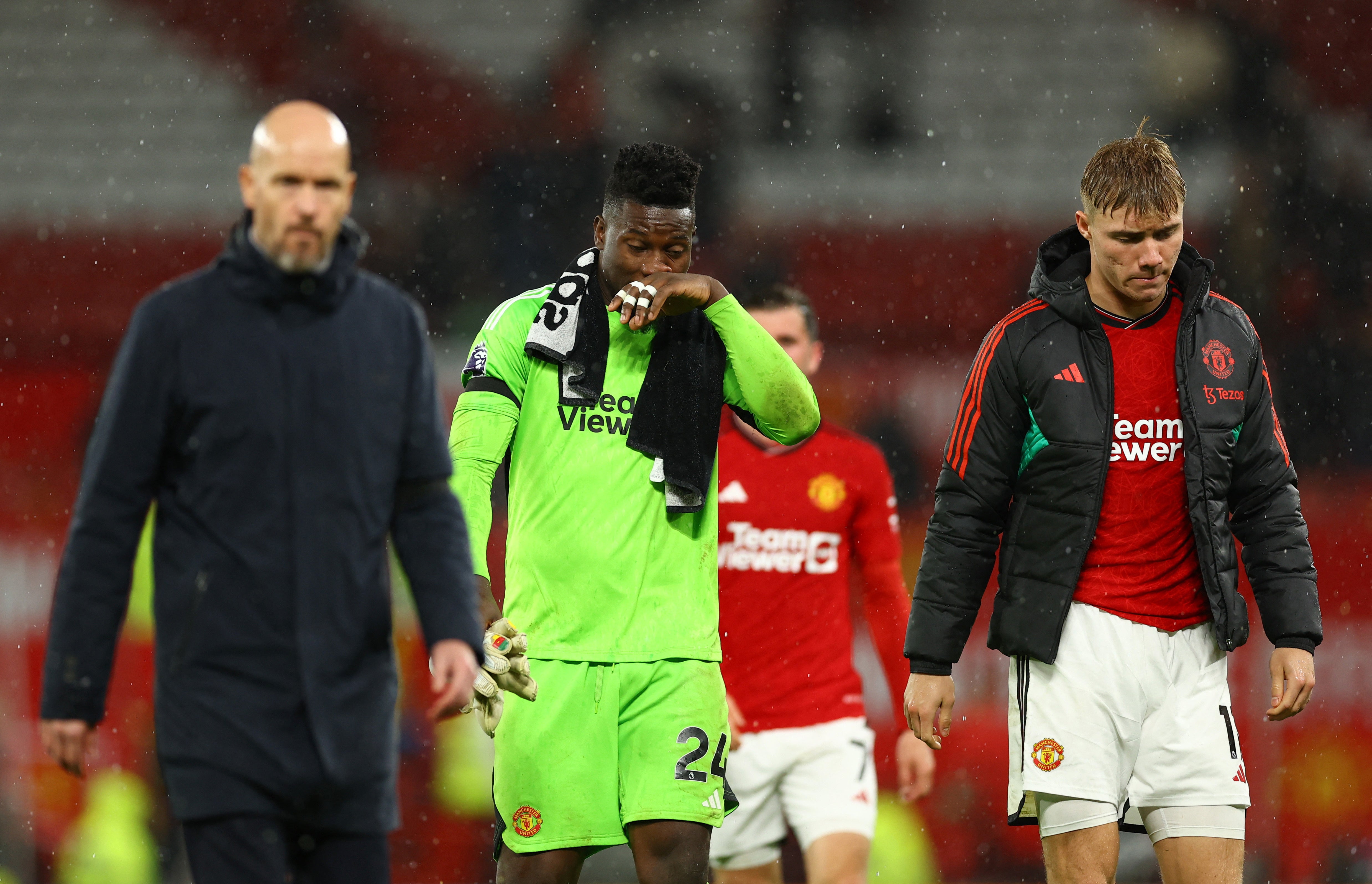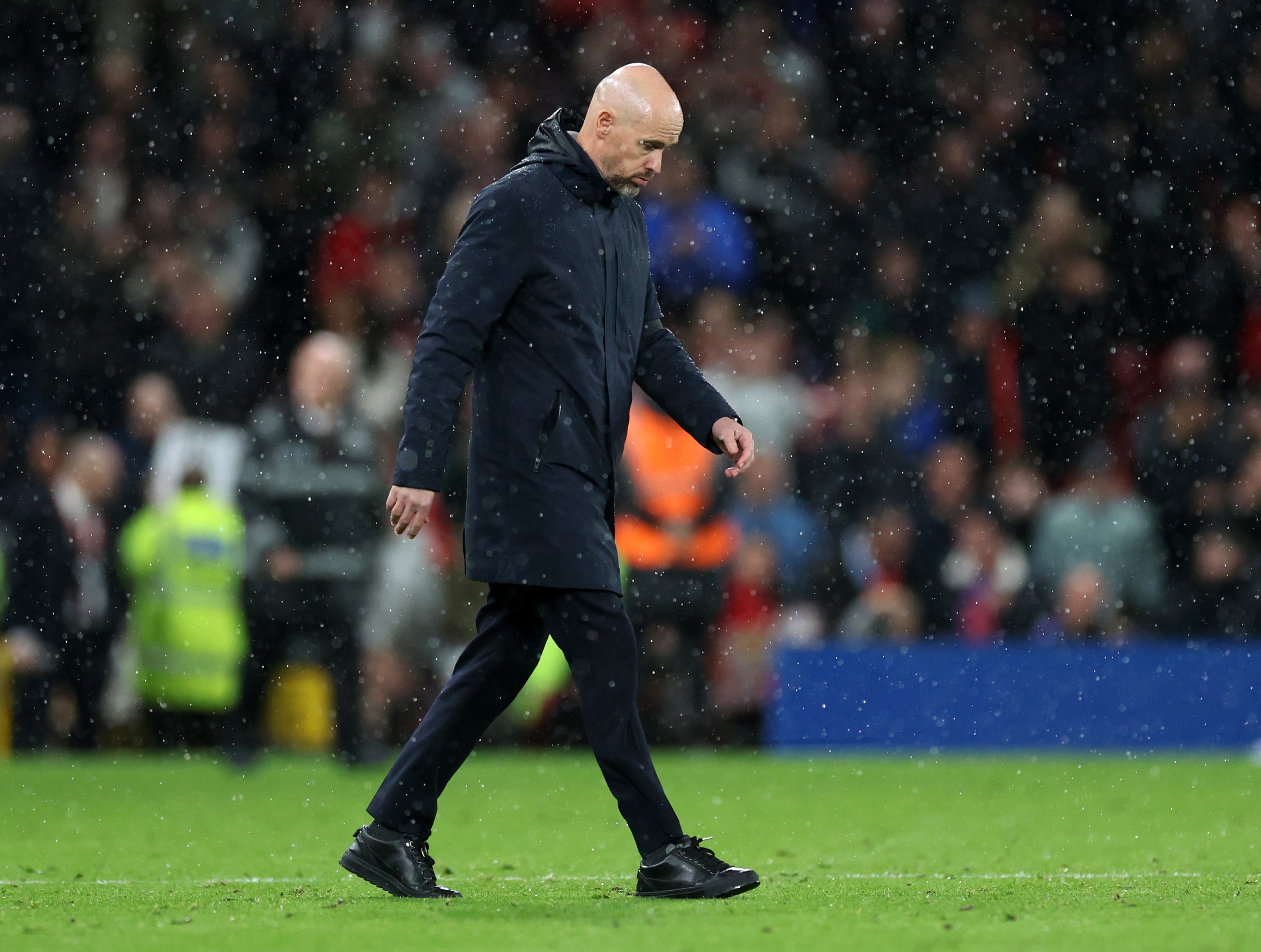Erik ten Hag’s deluded message leaves Man Utd with a brutal reality
The Dutch manager insisted Manhester United are ‘on the way up’ despite an alarming run of performances, but, Miguel Delaney argues, very few others will come to that conclusion after a heavy defeat to their rivals at Old Trafford
The Manchester United dressing room was naturally a quiet place after the latest embarrassment but perhaps that’s for the best judging by what Erik ten Hag said in public.
There’s an argument that his analysis of this 3-0 defeat to Manchester City was more concerning than the performance. That result is, after all, to be expected now, part of larger longer-term trends.
The big question is not how or why United lost but whether Ten Hag actually believed what he said about it.
That, collected together, was the following.
“First half we had a very good gameplan and the execution was also very good.
“From chances, it was very toe to toe.
“The three games before we won and the spirit is very good. I think we are on the way up.”
It’s possible he was the only person at Old Trafford who would have expressed this. Most were aghast at how easy it had been for City, except for the away fans who were giddily revelling in just how far ahead of their old rivals they are.
Ten Hag was possibly right in saying the penalty to make it 0-1 in the 26th minute “changed the game” but only insofar as it completely changed the demands on United. They could no longer play underdog football, and had to leave themselves open to a battering that has been worse than for any other side who have faced City this season, bar Fulham.
That’s why so much of what he said felt hollow. It is stretching credulity to describe anything as “toe to toe” when United could barely step out of their own area or get their foot on the ball. And, sure, United did have openings when the game was in the balance but they all came from overt individual will rather than any kind of collective play, such as Rasmus Hojlund’s drive forward.
As regards whether the gameplan worked well, the obvious question is what that gameplan actually was.
To not get beaten by more?

People at the elite end of sport have to have a certain amount of delusion but there is a very thin line between trying to make people believe in the team and denying reality. Some of Ten Hag’s comments had echoes of the worst of Ole Gunnar Solskjaer, Jose Mourinho and David Moyes. The brutal reality was that this looked and sounded like endgame stuff, scrabbling for results and then trying to see positives amid overwhelming negatives.
It’s why Ten Hag’s comment about being on the “way up” would have widened so many eyes. There may have been three wins in a row before the City game but not one was convincing. All came from individual moments amid collective torpor. There is no attacking coherence. The team doesn’t look like it builds play.
Any concept of an “idea” seems to have gone.
So, given the echoes of the sacked managers before him, does that mean it’s already that time again?
Not necessarily, and the current United board want to keep faith precisely because they do not want to get into the same cycle where the solution is always changing the manager. There is an awareness that there are bigger issues, which the prospective Ineos bid has raised in its negotiations to take over a minority stake.
There are still worries, though, and issues that Ten Hag badly needs to address.
The worst is that it feels like United are just going from game to game, hoping to get through so things eventually smooth and they can build again. There is a logic to that, but the inherent problem to the approach is that you're almost inevitably going to come up against a side that sets you right. It need not be City, either. Given how United are playing, any number of teams can do that, as we’ve seen in so many games already.

It’s why it’s all so familiar. What is so concerning, though, is that Ten Hag was specifically supposed to mark a move away from all that. He was supposed to introduce a new ideology. There were even signs of it up to February.
Now, after a summer where he did get signings he wanted, there’s been a dramatic regression.
You can see almost all of his predecessors since Sir Alex Ferguson in the team, and not in good ways.
There have been the scrambled performances of Solskjaer’s time, where everything is so ad hoc and game to game. There have been the strange post-game comments of Moyes, where he seemed to be watching a different game or finding far too much good in what was otherwise very bad.
There has been the dogmatism of Louis van Gaal, at least in terms of certain roles and his refusal to deviate from certain interpretations of how he sees it. Most recently, and most worryingly, there have been the abrupt personnel decisions of Mourinho. Players such as Raphael Varane, Harry Maguire and Scott McTominay have abruptly found themselves in or out of favour based on rationales that don’t make immediate sense.
The hope is that Ten Hag is building to something bigger. It’s just that there is little evidence of that.
He needs much more to really prevent going the way of all of his predecessors.
Join our commenting forum
Join thought-provoking conversations, follow other Independent readers and see their replies
Comments


Bookmark popover
Removed from bookmarks